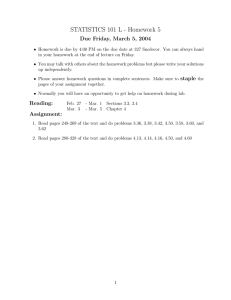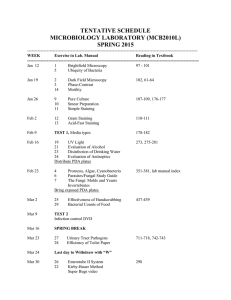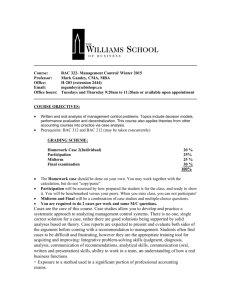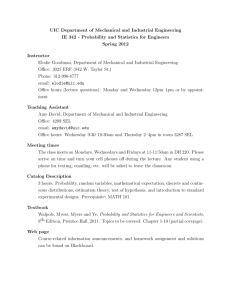Spring 2014 Acct 3270 (Cost Accounting) 940-565-3090
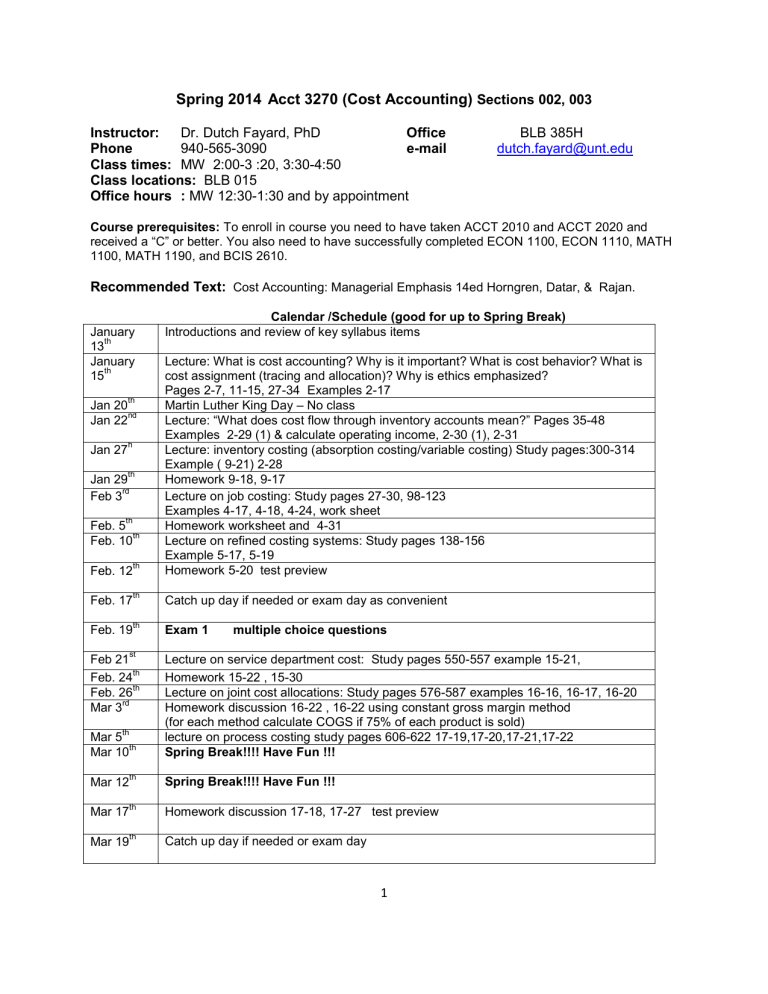
Spring 2014 Acct 3270 (Cost Accounting)
Sections 002, 003
Instructor: Dr.
Dutch Fayard, PhD
Phone 940-565-3090
Class times: MW 2:00-3 :20, 3:30-4:50
Class locations: BLB 015
Office e-mail
BLB 385H dutch.fayard@unt.edu
Office hours : MW 12:30-1:30 and by appointment
Course prerequisites: To enroll in course you need to have taken ACCT 2010 and ACCT 2020 and received a “C” or better. You also need to have successfully completed ECON 1100, ECON 1110, MATH
1100, MATH 1190, and BCIS 2610.
Recommended Text: Cost Accounting: Managerial Emphasis 14ed Horngren, Datar, & Rajan.
Calendar /Schedule (good for up to Spring Break)
Introductions and review of key syllabus items January
13 th
January
15 th
Lecture: What is cost accounting? Why is it important? What is cost behavior? What is cost assignment (tracing and allocation)? Why is ethics emphasized?
Pages 2-7, 11-15, 27-34 Examples 2-17
Jan 20
Jan 22 th nd
Martin Luther King Day – No class
Lecture: “What does cost flow through inventory accounts mean?” Pages 35-48
Examples 2-29 (1) & calculate operating income, 2-30 (1), 2-31
Jan 27 h
Lecture: inventory costing (absorption costing/variable costing) Study pages:300-314
Example ( 9-21) 2-28
Jan 29 th
Homework 9-18, 9-17
Feb 3 rd
Lecture on job costing: Study pages 27-30, 98-123
Examples 4-17, 4-18, 4-24, work sheet
Feb. 5 th
Feb. 10 th
Homework worksheet and 4-31
Lecture on refined costing systems: Study pages 138-156
Feb. 12 th
Example 5-17, 5-19
Homework 5-20 test preview
Feb. 17 th
Catch up day if needed or exam day as convenient
Feb. 19 th
Exam 1 multiple choice questions
Feb 21 st
Lecture on service department cost: Study pages 550-557 example 15-21,
Feb. 24
Feb. 26 th th
Homework 15-22 , 15-30
Lecture on joint cost allocations: Study pages 576-587 examples 16-16, 16-17, 16-20
Mar 3 rd
Homework discussion 16-22 , 16-22 using constant gross margin method
Mar 5 th
Mar 10 th
(for each method calculate COGS if 75% of each product is sold) lecture on process costing study pages 606-622 17-19,17-20,17-21,17-22
Spring Break!!!! Have Fun !!!
Mar 12 th
Spring Break!!!! Have Fun !!!
Mar 17 th
Homework discussion 17-18, 17-27 test preview
Mar 19 th
Catch up day if needed or exam day
1
Mar 24 th
Exam 2
Mar 26 th
Last day to withdraw from the course with a W as long as you have a 60 or greater.
Lecture on Cost estimation and budgeting: study pages 184-203, 340-358
Examples
Mar 31 st
Budgeting homework discussion 6-21, 10-17 (parts 2&3), 10-20, 10-21, 10-38 (parts 3 and 4)
April 2 nd
Lecture chapter 7 ( the entire chapter) examples
April 7 th
Lecture chapter 8 (the entire chapter) examples
April 9 th
Variance homework discussion 7-18 (calculate flexible budget amounts and determine relevant variances) 7-26, 8-16, 8-17, 8-27
April 14 th
Lecture chapter 3 and Life-cycle: study pages 62-80 , 447-449
April 16 th
Examples (
Homework chapter 3 and CVP / life cycle costing homework discussion 3-22, 3-31
April 21 st
(parts 3 and 4), 3-27, 12-25
Lecture chapter 11 390-412, 587-588 Examples (11-16, 11-18,
April 23 rd
Homework chapter 11 (11-21, 11-23 (hint: which product uses more machine hours),
11-25
April 28 th
Flex day
April 30 th
Flex day
May 5 th
or
7 th
Exam 3
COURSE OBJECTIVES:
This course covers issues related to accounting for the costs associated with running a company and using cost information to make important business decisions. Many of these concepts will be covered on
CPA and CMA exams. As part of this course we will focus on some of the largest and most complex financial statement accounts; COGS and inventory. After completing this course, students should have the skills and knowledge to:
•
Understand common cost accounting terms
•
Recognize difficulties associated with assigning costs to units of products produced and sold.
•
Demonstrate how costs flow through inventory accounts to the income statement.
•
Determine balances of financial statement accounts associated with inventory/production costs and costs of goods sold.
•
Relate appropriate product costing methods to various production and merchandising settings.
•
Quickly prepare simple budgets and explain the role of budgeting.
•
Measure and offer plausible explanation for deviations from the budgeted costs and revenues.
•
Make decisions related the cost structure of the company.
•
Identify and use relevant information in common business decisions.
2
TEACHING PHILOSOPHY:
(Help students succeed)
I view my role for this class as giving students the opportunity to learn facts and develop skills that make them value-added employees:
•
I teach topics and skills that employers say they want.
•
I provide knowledge that will be useful and relevant to students.
•
I emphasize the relevance through examples of common business problems.
•
Motivate student to engage in activities that will allow them to succeed.
•
Encourage students to engage in opportunities outside of the class to network and develop skills.
•
Require students to take ownership of their success.
•
I identify the degree to which students have successfully learned the course material.
Average Weekly Time Students should Plan to spend for this course
In class ~3 hours
Preparation for class ~1.5 hours
Homework test preparation
Total
~1.5 hours
~1 hours
~ 7 hour/week
Several factors that will affect how much time you may need to devote to this class each week, but it is up to the student the appropriate time that they must spend.
Online resources
Over the years that I have taught this course, I have developed several resources that have helped students succeed in this course. I make them available to students via blackboard. They are as follows:
Concept flashcards
Online problems to test your ability to work problems quickly.
Online lessons via edu-creation
Extra-credit
Success in this course will not come from extra credit. Student focus on extra credit almost serves as a shortcut reading and working homework and examples. However, consistent with my teaching philosophy, during the semester, I may provide students with the opportunity to earn extra credit points to be added to their exam grade.
Note: Extra credit will not be provided on an individual basis and those who miss their opportunity will not be given another opportunity. Individual requests for extra credit may result in the loss of extra credit opportunity for everyone.
Course grade determination
Your course grade will be the average of the 3 unit grades. Each test is a third of your grade.
Course letter grades will be assigned to each student based on the following standard grade scale a course grade of 90 or higher = A; a course grade between 80
‐
89.99 = B; a course grade between 70
‐
79.99 = C; a course grade between 60
‐6
9.99 = D; a course grade less than 60 = F;
3
Exams
Your grade in the course will be predominantly based on your exam grades which focus on problem solving and cost accounting concepts. I have planned 2 midterm exams and a final exam designed to cover the newest material as well as some conceptual aspects related to prior exams. The midterms will be 80 minutes. The final exam will be 120 minutes. The anticipated dates are included on the course schedule above.
Unit grades At a minimum, your unit grade will be the same as your test grade. However, students that demonstrate excellent participation and preparation will get an adjustment to their grade as follows:
Unit grade =(Exam grade x .80) + 20
To earn this adjustment for a unit, students must do the following
1. Attend every class related to the respective test.
2. Arrive to class on time and reaming in class the entire time.
3. Complete the assigned readings, examples, and homework and be prepared to summarize it.
4. Attend at least one profession meeting during the semester and provide a one-page write-up of what they learned from that meeting.
The following are examples of activities they will prevent students from getting this adjustment:
1. Missing one class
2. Being late for one class.
3. Being unprepared or unwilling to discuss the reading.
4. Being unprepared to discuss homework or examples.
5. Texting or using electronic devices in class.
6. Sleeping in class.
7. Working past the allowed exam time.
8. Disruptive behavior in the classroom.
9. Any misconduct as defined by school policy.
Attendance, Tardiness and Attentiveness Policy
This is a face-to-face class; student attendance, on-time arrival, and attentiveness are expected for every class session!!!
Homework (Early test preparation):
For each topic, we will cover homework problems related to the desired course material. Homework will general include problem solving exercises. I will look at student homework regularly and may call on students to discuss their attempts to the homework before I cover the homework. Test questions will not be copies of homework but will apply the same concepts.
Withdrawal Dates
Students choose to withdraw from courses for any number of reasons. If you have a question about withdrawal, please feel welcome to ask me. I will discuss withdrawal dates in class.
4
Course Resources
My Office Hours – This is the best way for me to help students with questions about homework and online problems.
E-mail – Email can be an effective way to communicate with certain guidelines:
•
The question should be a general questions about the course not covered in the syllabus.
•
The question should only require a simple response. For example, if you have a question about a problem, you may send me your work and
Topics that I prefer to address in person rather than email include:
Question about grades,
Questions that don’t apply directly to the class. For example, if you want information about internships, overseas experience or professional groups.
Question about how you can do better in the course.
Accounting Lab and University Tutoring services
• The tutors in the accounting lab should be able to help you if you have specific questions.
This is not an alternative to reading, coming to class and asking questions!!!
This is not designed for you to do homework!!!
• The room and hours for the lab will be announced in class and posted on Blackboard.
Blackboard
• I will use Blackboard to post the syllabus, provide supplemental information, post grades, and post any necessary discussion messages or announcements. This will be my primary method of communication to the class as a whole, so you will need to check Blackboard regularly.
Students with disabilities
If you have an established disability as defined in the Americans with Disabilities Act and would like to request accommodation, please present your written accommodation request on a form supplied by
UNT’s Office of Disability Accommodation by the end of the second week of classes.
HOW-TO ENSURE YOUR SUCCESS
1.
Attendance: Attendance is essential to succeeding in this course.
2.
Attentiveness: There is no credit for attendance, so you might as well participate.
3.
4.
5.
6.
7.
Read the assigned readings thoroughly: It will prepare you for the lecture.
Work the examples: Attempting these examples on your own will prime your ability to understand how to work these problems.
Complete the homework: Completing it will help you understand the concepts or identify concept that need your attention.
Use the online resources: Essentially all of my past top students attribute a big part of their success to the online assessment problems.
Take advantage of office hours if needed: I can usually get you in the right direction if you are struggling with a subject.
5
Accounting Department Policy
Statement on Academic Dishonesty
The following is the accounting department position on cheating and plagiarism. In particular, note that you have a responsibility to report violations and potential violations. All students are expected to be academically honest. Every effort will be made by your instructor and this department to discourage cheating. Awareness of academic dishonesty by a classmate is considered the equivalent of cheating unless it is reported. The following University guidelines apply:
“ All students found guilty of cheating or plagiarism will (at a minimum) receive an F on the assignment in question and could be expelled from the university.
Plagiarism and cheating refer to the use of unauthorized books, notes, or otherwise securing help on a test; copying tests, assignments, reports or term papers; representing the work of another person as one’s own; collaborating, without authority, with another student during an examination or quiz or in preparing academic work; signing another student’s name on an attendance sheet; or otherwise practicing scholastic dishonesty.”
Also note that the school has a new academic integrity policy that can be read at the following website: http://vpaa.unt.edu/academic-integrity.htm
The following course policy also applies:
Any student observed cheating will be to assigned a grade of 0 on the assignment and will lose any and all adjustments made to test grades.
Conduct
The primary concern of the University of North Texas is the student. The university attempts to provide for all students a campus environment that is conducive to academic endeavor and social and individual growth. To that end, rules, regulations and guidelines governing student behavior and the student's relationship with the university have been formulated into a student code of conduct and discipline.
Enrollment at the University of North Texas is considered implicit acceptance of these and other policies applicable to students, all of which are educational in nature and designed to help students understand expectations and accept responsibility for their own actions. The Code of Student Conduct can be found at http://deanofstudents.unt.edu/sites/default/files/images/code_of_student_conduct.pdf
Please note that this syllabus represents my current plans and objectives. As we go through the semester, those plans may need to change. Any changes will be communicated via Blackboard and via class announcement. It is YOUR responsibility to be aware of changes announced.
6
